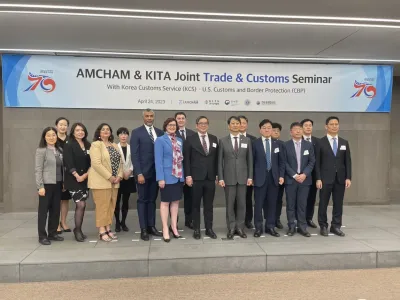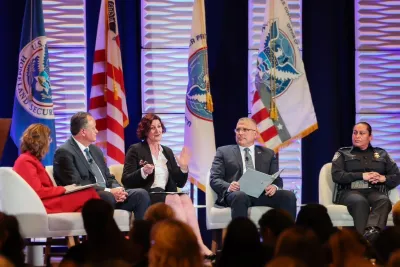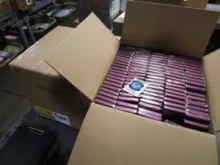-
Collaboration is at the top of my mind this month. In April, CBP led many engagements to share information with and receive input from private companies, partner government agencies and foreign governments. This will always be a top priority for us. Today’s rapidly evolving global trade environment is too dynamic to be managed by the Office of Trade alone. With the increasing pace and volume of modern trade, working together is a necessity.
Contemporary supply chain challenges are very different from what they were 20 years ago. The rise in e-commerce and low-value shipments has greatly increased the risk of illicit goods, including those made with forced labor, entering United States commerce. To share the latest best practices and requirements for navigating these complex supply chain issues, CBP hosted the 2023 Trade Facilitation and Cargo Security Summit from April 17-19 in Boston, MA, for members of the global trade community. At the end of April, the Office of Trade joined a CBP delegation to Korea to meet with key stakeholders in the Korea-U.S. trade alliance and to participate in Korea Customs Week, which had over 500 customs-related professionals from international organizations and customs administrations representing over 70 countries. We fielded questions and provided guidance on CBP’s enforcement priorities as well as new technologies, tools and resources for addressing the challenges posed by e-commerce and forced labor in Asia Pacific supply chains.
Sharing information is more important than ever. We each hold a different piece of the puzzle in protecting the U.S. economy from illicit trade. The Office of Trade cannot realize its vision of a fast, secure, data-driven 21st century trade environment without its trade community partners. In this issue of the Trade News Snapshot, you will see some of the work we have done with different partners at home and around the globe to develop and enforce policies that ensure the facilitation of legitimate international trade.
~ Executive Assistant Commissioner AnnMarie R. Highsmith
Contents
I. Office of Trade Activity
EAC Highsmith speaks at Trade and Customs Seminar in South Korea
On April 24, Executive Assistant Commissioner (EAC) AnnMarie Highsmith delivered keynote remarks alongside Korean Minister for Trade Ahn Duk-geun at a Trade and Customs Seminar co-hosted by the American Chamber of Commerce in Korea and the Korean International Trade Association. From April 26-28, EAC Highsmith joined CBP Deputy Commissioner Benjamine “Carry” Huffman and Ian Saunders, the U.S. Candidate for Secretary General of the World Customs Organization, at the inaugural Korea Customs Week. At the event, the Korea Customs Service hosted top decision-makers from 76 customs agencies to discuss shared issues and interests, including digital customs initiatives, disruptive technologies, trade facilitation, counternarcotics, and customs information sharing.
EAC Highsmith presented on the ways CBP is tackling challenges posed by e-commerce, forced labor and complex global supply chains. She stressed the importance of businesses and government working together to create more transparent supply chains. The Asia Pacific region has the highest number of people in forced labor in the world —15.1 million. Eliminating forced labor from U.S. bound supply chains and implementation of the Uyghur Forced Labor Prevention Act (UFLPA) are a top priority for CBP and the Department of Homeland Security. Since the implementation of the UFLPA rebuttable presumption in June 2022, CBP has held more than 244 engagements with industry partners to provide guidance and information about compliance.
EAC Highsmith also discussed key CBP and industry joint initiatives to increase the visibility of dynamic, global supply chains. One way that CBP is working with industry to increase supply chain transparency is by improving the quality and efficiency of our data for identification, enforcement and risk assessment through the Global Business Identifier Evaluative Proof of Concept, or GBI test. EAC Highsmith explained to businesses how they can participate in the GBI test as well as ways to get involved in other initiatives to increase supply chain transparency.
CBP convenes Trade Summit in Boston
On April 17-19, CBP hosted the Trade Facilitation and Cargo Security Summit in Boston, bringing together industry professionals, partner agencies and other stakeholders to discuss the latest trade developments and best practices.
On the first day of the Summit, EAC Highsmith spoke to stakeholders and answered questions from the audience during the CBP Leadership Town Hall. EAC Highsmith emphasized the importance of strong collaboration and flexibility amid tremendous changes in the trade landscape over recent years. Other panel discussions over the course of the Summit included supply chain resiliency, de minimis challenges and solutions and strategies to protect human rights.
The Summit also highlighted the importance of fostering global partnerships and cooperation to combat corruption. On April 17, CBP leaders, including Acting Commissioner Troy Miller, signed a Mutual Recognition Arrangement with representatives from the Customs Administrations of Guatemala and Colombia. This arrangement ensures that the industry partner programs of each administration maintain similar security requirements and procedures to CBP’s Customs Trade Partnership Against Terrorism (CTPAT) program, a voluntary U.S. public-private sector partnership. Because of this compatibility, member administrations can exchange information about participating businesses, which allows them to expedite the validation process and extend the benefits of one program to members of the other.
CBP modifies Smart Glove Withhold Release Order
On April 26, CBP modified its November 4, 2021 Withhold Release Order (WRO) targeting synthetic, disposable gloves manufactured in Malaysia by a group of companies jointly known as Smart Glove. The modification acknowledges that Smart Glove has taken sufficient remediation efforts to ensure its products are no longer produced wholly or in part with forced labor. These efforts included repayment of recruitment fees, improvements to living conditions and the creation of new worker-centered policies. As such, Smart Glove shipments will now be allowed to enter U.S. commerce as long as they are otherwise in compliance with U.S. laws. This is the third WRO modification that CBP has issued in 2023.
II. Outreach
CBP hosts a de minimis 101 webinar for 2,330 members of the trade community
On April 5, CBP held a de minimis 101 webinar for the trade community. De minimis provides admission of imported articles free of duty and tax if the total value of the goods is less than $800. The webinar provided an overview of the de minimis exemption and requirements, the mechanisms for release of de minimis shipments and CBP’s de minimis programs. The webinar also highlighted the expansion of the Section 321 Data Pilot and how companies can participate. The Section 321 Data Pilot is a public-private partnership that mitigates risk and expedites legitimate low value e-commerce shipments. Expanding participation in the Section 321 Data Pilot provides greater information to help identify, disrupt and deter illegal practices like counterfeit goods that threaten legitimate businesses and the health of the American people.
DEAC Leonard delivers keynote address to U.S. Chamber of Commerce’s Combat Counterfeiting event
On April 25, Deputy Executive Assistant Commissioner John Leonard delivered keynote remarks during the U.S Chamber of Commerce’s Global Best Practices to Combat Counterfeiting event in Washington, D.C. DEAC Leonard spoke on current trends and hot topics in the illicit trade space: how the Office of Trade works multilaterally to combat counterfeiting both abroad and within our borders, and the importance of public/private collaboration.
III. News You Can Use
CBP issues cybersecurity guidance for supply chain resiliency
WASHINGTON – On April 10, CBP released Cyber Incident Guidance for Customs Brokers, a new document detailing best practices for customs brokers to prepare for, handle and recover from a cyber-attack. The document describes various strategies and insights collected in collaboration between CBP, partner government agencies and licensed customs brokers.
This cybersecurity guidance is part of the Office of Trade’s efforts to strengthen resiliency by establishing clear expectations and procedures for organizations that are dealing with cyber-attacks. With this, CBP aims to mitigate the effects of cyber-incidents on the supply chain for consumers and businesses throughout the U.S.
Louisville officers seize thousands of counterfeit designer jewelry pieces
LOUISVILLE, Ky. – On April 3, CBP officers in Louisville seized the contents of three inbound shipments of jewelry for bearing counterfeit designer trademarks. The three shipments, all originating from Hong Kong and bound for private residences in the U.S., contained 2,400 bracelets and pendants bearing the suspected trademarks of brands including Chanel, Van Cleef and Arpels, Dior and Gucci.
In total, the shipments seized on April 3 would have amassed a suggested retail value of $4.41 million if they were genuine. An investigation into the shipments led by Homeland Security Investigations is ongoing. You can read more about the seizure on CBP.gov.
Trade Statistics
Monthly Trade Statistics
In March 2023, CBP processed more than 2.7 million entry summaries valued at more than $274 billion, identifying estimated duties of nearly $6.1 billion to be collected by the U.S. government. Trade via the ocean environment accounted for more than 38.27 percent of the total import value, followed by air, truck and rail. CBP identified 400 entries valued at more than $122.7 million for further examination based on the suspected use of forced labor. These may be subject to a Withhold Release Order, forced labor Finding, or the Uyghur Forced Labor Prevention Act’s rebuttable presumption prohibiting importation into the United States.
CBP seized nearly 1,798 shipments that contained counterfeit goods valued at more than $335 million. CBP also completed 29 audits that identified $24.7 million in duties and fees owed to the U.S. government for goods that had been improperly declared. CBP collected over $33.1 million of this from identified revenue and from previous assignments.





